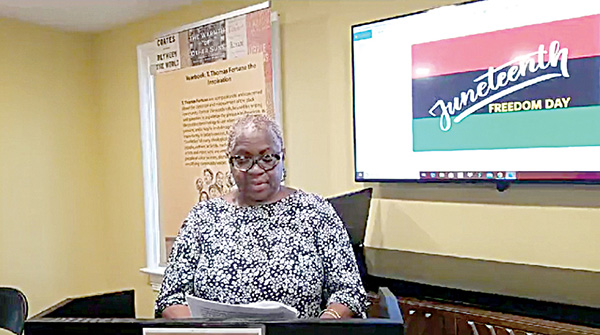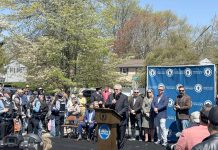
RED BANK – It’s a historic time in the U.S. as protests continue for the Black Lives Matter movement, demanding justice and equality for people of color impacted by systemic racism.
That’s what made this year’s Juneteenth celebration, also known as Freedom Day, extra special.
“For the first time in the nation’s history, we can say it’s a special day. It is a day that is now being reckoned with for the recognition of freedom,” said Walter Greason, Ph.D., associate professor and chair of Educational Leadership at Monmouth University and president of the T. Thomas Fortune Foundation. He was also a guest speaker at the T. Thomas Fortune Cultural Center’s Juneteenth celebration last Friday.
The June 19 holiday is celebrated annually and marks the emancipation of enslaved people in the U.S. On that day in 1865, Union Gen. Gordon Granger arrived in Texas after traveling with troops across the South to announce that the Civil War had ended and that slaves were free.
This was the second year the center hosted an event for the holiday, which was livestreamed for viewers at home.
“This is our moment, all of us, who are coming together collectively to stand up and fight for the rights for African American people and all marginalized people,” said Gilda Rogers, vice president of T. Thomas Fortune Foundation. “We are in a historic moment right now.”
Birgit Mondesir, executive board member of the T. Thomas Fortune Cultural Center, shared an open commentary on the racial tensions happening now in the country, which she titled “Let’s Call A Thing A Thing.” (See Mondesir’s commentary on page 9.) In it, she spoke of Tulsa’s former “Black Wall Street” and what became of it at the hands of white supremacists. She reviewed the problems faced by Black Americans and spread the message that things should be called out for what they truly are.
“Juneteenth, June 19, 1865, the day white people could no longer keep our emancipation a secret, should be memorialized as Emancipation Day for all Americans, and assigned at least the same importance as the 4th (of) July. However, most white people, and some Black people, have never even heard of Juneteenth, until now,” said Mondesir. “That’s because the history of America has been usurped and arrested, much like the lives of its Black people.”
She also addressed the ways that Black Americans fought for the U.S. despite not being treated as Americans. That includes in the Revolutionary, Civil, Korean and Vietnam wars, and both World Wars, despite when they were segregated to do so, she said.
“This should all be the headlines in our history books, but it’s not, because that history was written by those who controlled it; corrupted by those who refuse to acknowledge America’s sins against humanity,” said Mondesir. “Instead, some Americans readily accept the ridiculous jabbering of a fool instead of facing the truth. Black people are more American than the most American of us. We fight every day to be American. That’s why Black Lives Matter.”
Greason later told The Two River Times, “Juneteenth represents the opportunity to build new institutions that expand freedom for people everywhere. The T. Thomas Fortune Cultural Center is one significant example of the social transformations that become possible when we pursue the idea of equal justice that the holiday symbolizes.”
Monmouth University
In 2014, Greason and a few colleagues created a presentation series at Monmouth University in West Long Branch about former U.S. President Woodrow Wilson. The university’s Wilson Hall is named in his honor. The series touched on Wilson’s work as a diplomat, a former governor of New Jersey and as president. It also covered Wilson’s history of segregationism during his time in the White House and the ways he reversed many political promises of equal rights, said Greason.
Now, amid the vigorous Black Lives Matter movement, the board of trustees and president at the university unanimously voted to remove Wilson’s name from the campus.
“On this Juneteenth 2020 – a day when we celebrate the end of slavery in the U.S. – we continue to seek ways to foster a genuinely fair, inclusive and supportive community for all. Through numerous conversations with students, faculty, staff and alumni over the past few weeks, one thing is clear: we must do more, especially as we prepare to enroll this fall our most diverse incoming class ever,” said Patrick Leahy, Ed.D., university president, in a letter to alumni.
Wilson Hall will be renamed “the Great Hall at Shadow Lawn,” he said, calling Wilson a “controversial politician” who had never actually been inside the current building on campus.
“Removing his name, and incorporating these earlier names, connects the centerpiece of our campus more accurately to our historical roots and eliminates a symbolic barrier to the important work of creating a truly welcoming and inclusive space in the Great Hall,” said Leahy.
Additionally, the university will honor Julian Abele at the Great Hall, one of the first professionally trained African American architects who was a lead designer of the existing building, said Leahy. The campus will also soon establish a permanent endowment to support Monmouth’s diversity initiatives, with $3 million in inaugural funds for that purpose, he added.
“Growing the size of this fund will become a key philanthropic priority for the university’s next fundraising campaign, which will launch in the years ahead. This restricted endowment will support diversity programming and educational initiatives, curricular and co-curricular integration, diverse faculty and staff
recruitment, and other related efforts,
all aimed at cultivating a welcoming and inclusive campus environment for all members of our university community,” said Leahy.
Asbury Park Unity Walk
On Friday, the Clergy of the Jersey Shore hosted a Juneteenth celebration unity walk and rally. Starting at Midtown Commons Park in Neptune, groups of individuals came together and walked to Springwood Avenue Park in Asbury to rally for unity and the meaning behind the holiday.
Hundreds turned out for the walk and rally that day, as shown in a video uploaded by Pastor Semaj Vanzant Sr. of Second Baptist Church in Asbury Park. He called the event a “great celebration of unity” and said he was grateful to everyone who turned out that afternoon.
The article originally appeared in the June 25 – July 1, 2020 print edition of The Two River Times.














